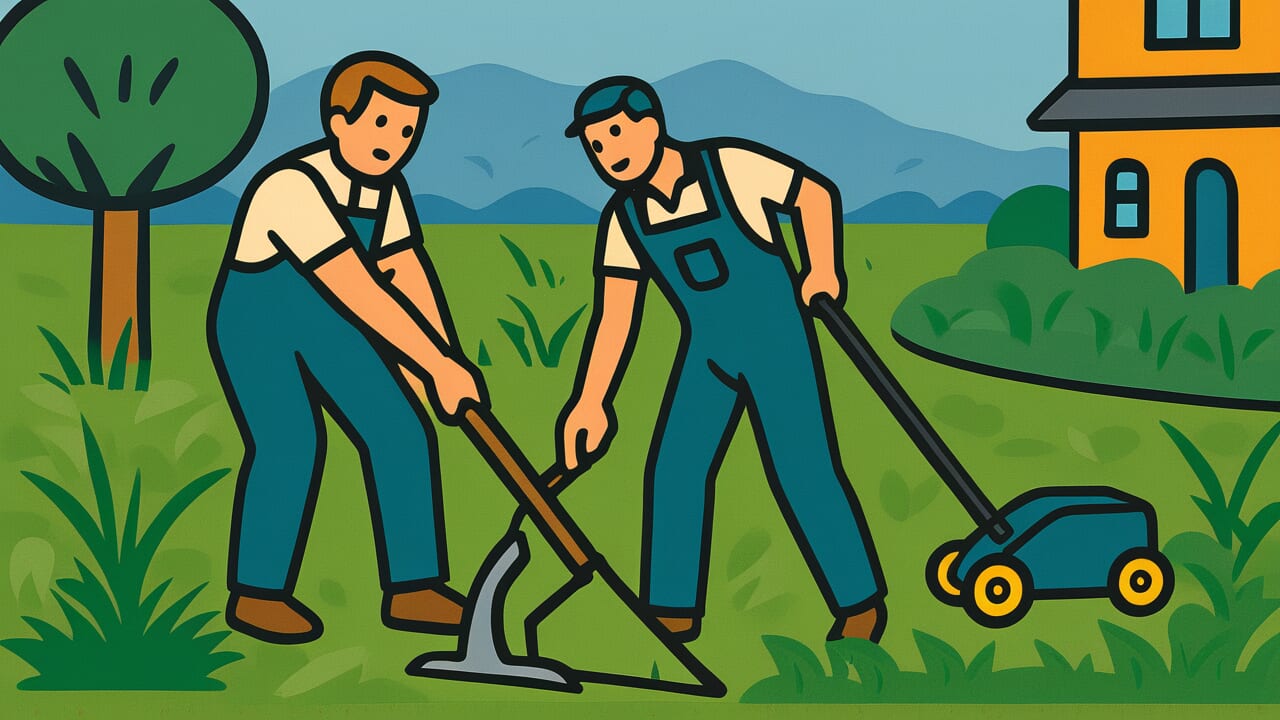How to Read “An uncle mows his nephew’s grass”
Oji ga oi no kusa wo karu
Meaning of “An uncle mows his nephew’s grass”
The proverb “An uncle mows his nephew’s grass” teaches that family members should help each other, even when they’re not immediate family.
Just as an uncle helps his nephew cut grass in the fields, relatives should support each other in times of need. This is the core message.
This proverb is used when talking about the importance of family duty and bonds.
Blood relations don’t automatically create mutual support. Instead, people must consciously choose to help each other.
The image of an older generation helping a younger one is particularly striking.
Today, nuclear families are common and extended family ties have weakened. But this proverb still reminds us of the spirit of family cooperation.
It teaches that relatives should reach out not just for weddings and funerals, but for everyday troubles too.
Origin and Etymology
No clear written records explain the origin of this proverb. However, we can make interesting observations from how the phrase is constructed.
The expression “An uncle mows his nephew’s grass” likely reflects the reality of mutual help among relatives in farming villages.
In old Japan, cutting grass in fields was hard labor that required many hands. Grass cutting before planting or harvesting was especially important because it affected crop yields.
The relationship between “uncle” and “nephew” is worth noting here.
It’s not as obligatory as parent and child, nor as equal as siblings. This subtle distance matters.
When an uncle mows his nephew’s field, it’s natural family help. But it also requires dedicating real time and effort.
Farm work involved the whole family, but when hands were short or a young household had just started out, relatives helping was expected custom.
This proverb likely symbolizes that spirit of mutual aid. Through the concrete image of grass cutting, it teaches the importance of family bonds and duty.
Usage Examples
- My uncle introduced me to his connections when I struggled with job hunting. It was truly like an uncle mowing his nephew’s grass—such caring support.
- If our young relatives are struggling with their move, we should help them. After all, an uncle mows his nephew’s grass, right?
Universal Wisdom
The proverb “An uncle mows his nephew’s grass” has been passed down because it contains deep insight into the unique power of blood ties in human society.
Humans naturally prioritize their own interests. Yet our ancestors understood something mysterious.
The invisible bond of blood has a strange power to inspire selfless actions.
What’s interesting is that this proverb doesn’t say “a parent helps a child.” Instead, it uses the slightly more distant relationship of uncle and nephew.
Help between parents and children is almost instinctive. But the uncle-nephew relationship has a delicate distance that doesn’t move on obligation alone.
That’s why help in this relationship requires more conscious goodwill and family awareness.
This proverb captures an essential truth about human relationships. Maintaining blood bonds requires more than just letting nature take its course—it needs active effort.
For the helper too, watching over and supporting a nephew gives meaning to life.
Humans confirm their own worth by being useful to others. Family mutual aid was an ideal reciprocal relationship.
Both the giver and receiver could deepen their bonds while preserving human dignity.
When AI Hears This
An uncle and nephew share a coefficient of relatedness of 0.25—one quarter of their genes.
According to evolutionary biologist Hamilton’s kin selection theory, altruistic behavior is genetically rational when “benefit to recipient × relatedness” exceeds “cost to self.”
For example, if an uncle spends one day mowing grass (cost 1) and the nephew saves four days of labor (benefit 4), the equation becomes 4 × 0.25 = 1, reaching the break-even point.
In reality, the nephew’s benefit would be much larger. Help during busy farming season increases harvest, and that economic value exceeds several days of labor.
What’s more interesting is that this isn’t a one-time event but a repeated game.
If the uncle helps his nephew this year, when the nephew grows up, he’s more likely to help the uncle’s children in the future.
In game theory, such “repeated prisoner’s dilemmas” mathematically prove that cooperation strategies yield higher payoffs than betrayal strategies.
Within kinship networks, if someone betrays cooperation, that reputation spreads throughout the family.
Blood groups function as “monitoring systems” that favor cooperators and exclude non-cooperators.
The uncle’s grass mowing is an investment in trust, a signal that maintains the cooperation level of the entire kinship network.
What seems like a loss is actually the optimal solution as a long-term genetic strategy.
Lessons for Today
This proverb teaches modern people the importance of “investing” in relationships.
In today’s society, spending your time and energy on others can seem wasteful. With weakened family ties, keeping up with relatives can feel like a burden.
But life brings unexpected difficulties. When they come, the relationships you’ve built will become the strength that supports you.
Like an uncle mowing his nephew’s grass, helping someone without expecting return actually enriches your own life.
The key is applying this spirit broadly, not just to blood relatives.
Advising a junior colleague, helping a friend move, joining community volunteer work—these small acts of mutual help build networks of trust.
The grass you mow for someone today becomes the foundation that supports you tomorrow.



Comments